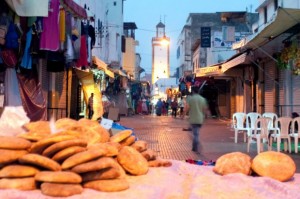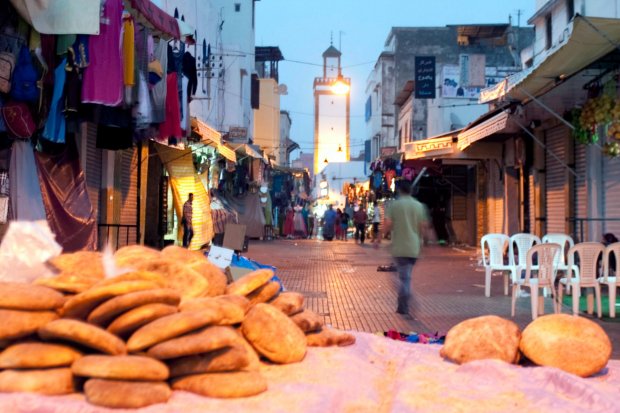 Casablanca, Morocco—“Eat the Harira, eat while it’s hot. Don’t be ashamed,” the host insisted, repeating this polite order three more times. Harira is a thick soup of tomatoes, chickpeas, meat and various spices that Moroccan Muslims traditionally eat in the holy month of Ramadan during the time when they break the fast.
Casablanca, Morocco—“Eat the Harira, eat while it’s hot. Don’t be ashamed,” the host insisted, repeating this polite order three more times. Harira is a thick soup of tomatoes, chickpeas, meat and various spices that Moroccan Muslims traditionally eat in the holy month of Ramadan during the time when they break the fast.
Only on this night, the host and cook of this Ramadan meal was a Jewish woman, Suzanne Abittan, who invited Muslim and Jewish neighbors and friends to her home in the city center of Casablanca, two floors above a synagogue.
Twelve people sat around a table laden with dates, traditional Moroccan pancakes, and sweets: nine women and three men—five of them Muslims and seven Jews.
“For generations Muslims and Jews grew up together here in Morocco, we are brothers and sisters and in some cases shared even the same mother’s milk,” Abittan said in a loud and strong voice, balancing a tray with hard boiled eggs and cut cucumbers as she walked from the kitchen into the living room.
The 59-year-old has worked for many years as a community outreach aide, helping poor families to access education for their children. “Jews and Muslims,” she said, “we don’t make a difference.”
But while the dinner symbolized a tolerance that has existed in this corner of the Maghreb for thousands of years, some Moroccans also worry about the effect of Arab Spring in their neighboring countries.
“All these countries are turning into chaos, the radicalization is increasing,” said Souad Fetouak, who works at the ministry of interior and is a friend of Abittan. Together they have created an association for tolerance to bring together Muslims, Jews and Christians in Casablanca.
“I am worried when I see what is happening in the countries around us,” said Fetouak, who is a Muslim. Her dark brown eyes looked over the table full of food and she sipped a cup of coffee—her first after a long day of fasting. “The countries are ending up in big messes.”
Above all, Fetouak said, she is concerned about the change in the mentalities and mindsets of people in the region. “Less tolerance and more issues for minorities,” she explained. She referenced a recent incident in Oujda, a city not far from the Algerian border. A female English professor had asked her college students to answer two questions on a final exam last month: “How does the history of the Jews prove their hatred towards other people?” and “How would you justify the fact that the immorality and misconduct of Judaism are basically due to a spiritual gap? Use historical facts to highlight your answers.”
Various organizations around the country protested after the exam questions came to light, including the Moroccan center for Human Rights (CMDH), whose president, Driss el-Yazami, said “we are still investigating the incident, but to us, this is a clear case of racism and clearly against human rights.” The professor, who was not reachable for comment, is apparently still teaching at the university.
“Of course it is not good when incidents like this one happen, but it is also important to see how fast the civil society has taken action against that,” said Serge Berdugo, head of the Jewish community in Morocco, during an interview in his office overlooking the old city of Casablanca.
“Apart from Morocco, Bahrain is the only other country in Islamic world where Jews are actively engaged into politics by the leadership.”
Morocco, he said, is facing the same challenges as all the other countries in the region right now—but it is finding different answers to the problems, in part because King Mohammed VI started the reform process in the country long time ago. “Don’t forget, the king here is commander of the faithful, which also includes Jews and Christians,” said Berdugo, who is the king’s ambassador-at-large.
Jews and Muslims in Morocco share a long history, Berdugo said, and that gave him and others in the Jewish community hope. While there are no exact statistics, between 3,000-4,000 Jews are living in Morocco—and worldwide, more than one million Jews claim Morocco as their country of origin. Many left Morocco between 1948, when Israel was created, and 1956, when Morocco won independence from the French protectorate.
It was King Mohammed V, the grandfather of the current king, who put Jews under his protection when Christian Europe had reached the peak of fascism and millions of Jews were being killed in the Nazi’s gas chambers and camps. At the time, the Vichy Government of France was trying to force its laws on Morocco, to compel Jews living in the European quarters of cities to move to the “mellahs,” or Jewish quarters. Morocco was also required to set quotas on the number of Jews who could serve as lawyers, doctors or public servants.
“My father was one of the public servants in Essaouira who lost his job, because of these laws,” Andre Azoulay, an advisor to King Mohammed, told me in a meeting at his home near Rabat. Azoulay has served 22 years as an advisor to two kings, Mohammed VI and his father, King Hassan II. Azoulay’s home boasts photographs of him with Palestinian leader Yasser Arafat, former German chancellor Helmut Kohl and U.S. president Bill Clinton.
During World War II Sultan Mohammed V, who later became King Mohammed V, took a strong stand against the Vichy regime and declared that Jews and Muslims should be treated equally, announcing that they and their property remained under the Sultan’s protection. And although the anti-Jewish sentiments increased in Arab countries after the announcement of the State of Israel, Mohammed V warned Muslims not to harm Moroccan Jews.
In 2011 Morocco cemented its multi-ethnic and multi-religious character in the constitution, which stated that, among others, the Jewish influences have “nourished” and “enriched” the nation’s identity and unity. The majority of Moroccans voted for the constitution in a referendum.
“This was a major and most important breakthrough not only in the history of Morocco but worldwide,” said Azoulay, adding that when people discuss clashes of civilizations and religions, this constitution was proving them wrong. “I am very proud of my people and my king, who made this possible,” he said.
To many in the West, Azoulay said, it may come as a shock and far beyond their ideas about Arab countries, when they hear that he, a Jew, is in such a high-level position in government. “Apart from Morocco, Bahrain is the only other country in Islamic world where Jews are actively engaged into politics by the leadership,” Azoulay said. He paused, before adding, “And both of the leaders are monarchs.”
BY SOUAD MEKHENNET
Daily Beast
TAGS:
News
World News
Morocco







